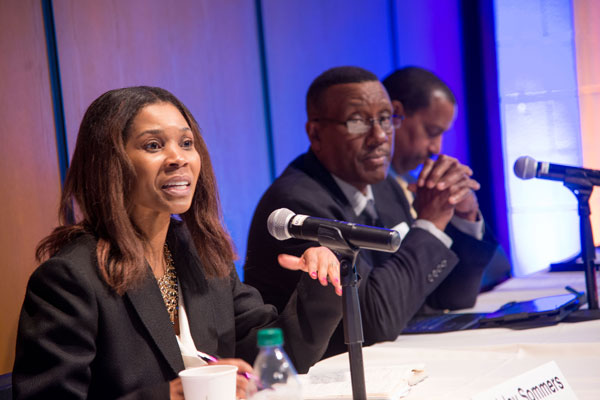Leading the Way
Nazareth’s conference shares what works in urban education
The stories you hear about urban education are typically about low test scores, poor attendance, and behavior problems.
But meanwhile, there are inner-city public schools and charter schools where most students are thriving.
Nazareth College brought together leaders from five successful schools in New York state to share what works — to inspire and inform others about approaches that enable underprivileged students to shine. More than 225 people attended the Leadership in Urban Education Summit on campus in March 2015, hearing also from two members of the state Board of Regents, a state Education Department official, and education leaders from Nazareth.
The College’s co-sponsor was Roc the Future, a collaborative community effort to help all children receive the opportunities and support to succeed in school and in life.
What’s next
The gathering produced such a buzz of optimism and possibility that participants asked convener Horace Smith, Ph.D., Nazareth’s special assistant to the president for diversity issues, to initiate follow-up meetings.
Smith envisions Nazareth expanding its work to teach teachers specific skills to be effective in urban schools: “The summit created an unusual opportunity for Nazareth to be doing something unique, something needed across the country in every urban environment.”
Summit panelist David Banks, founding principal of successful all-boys public schools in New York City and New Jersey, said his own college degree in education didn’t prepare him for dealing with high-energy, confrontational students who aren’t ready to learn. His own brother, Philip Banks III, exasperated teachers, yet Philip later rose to the second-highest position in the New York City Police Department. “We have to expect that all our children can achieve the greatness that’s within them,” said David, president/CEO of the Eagle Academy Foundation. Eagle Academy emphasizes parent engagement, mentors, rituals, and summer programs for its 2,000 students in six schools.
Naz alumni take away ideas
Attendee Lindsay Therrien ’04, who studied art education at Nazareth and is now an instructional coach at Southside Academy Charter School in Syracuse, took pages of notes. “The enthusiasm is amazing,” she said. Therrien, who has coached volleyball, was struck that panelist Michael Wiltshire, principal of Medgar Evers College Preparatory School in Brooklyn, said his high-poverty school requires every ninth-grader to choose a talent to develop over multiple years. The school for grades 6-12 has graduation rates above 95 percent. More than 30 Medgar Evers graduates are currently attending Nazareth.
Audience member Ruth Turner ’98, who studied social work at Nazareth and now is director of school counseling and social work for the Rochester City School District, said the conference was powerful. “I’m recharged,” she said. “If they can do it, we can.”
Daan Braveman, J.D., Nazareth’s president and the panel moderator at the summit, said the conference formed and strengthened partnerships and provided inspiration that ultimately will benefit the next generation: “It is difficult to imagine a more important topic than the need to ensure high quality educational opportunities for all our children, including those living in urban settings.”

Learn More
Nazareth College's Connections to Urban Education
- Young Scholars provides accelerated bachelor’s degrees for students with exceptional credentials from the College’s high school partners.
- School of Education undergraduate and graduate programs create teachers equipped to meet the needs of all students.
- Frontier Center for Urban Education conducts urban education research, supports and initiates promising practices, offers professional development for teachers, and more.
- Center for Civic Engagement programs include tutoring city students on campus and at nearly a dozen urban sites and Clinton Global Initiative University projects supporting disadvantaged students.